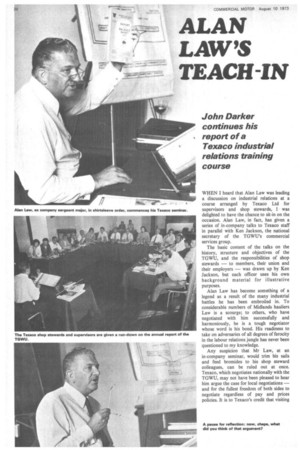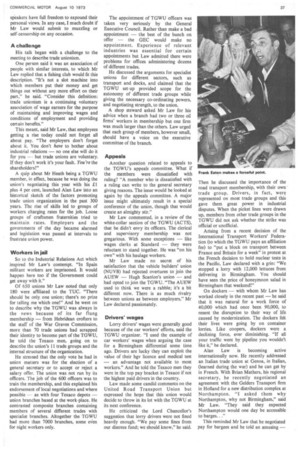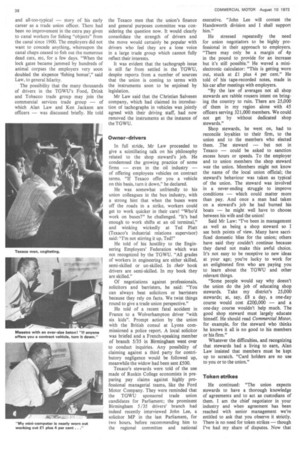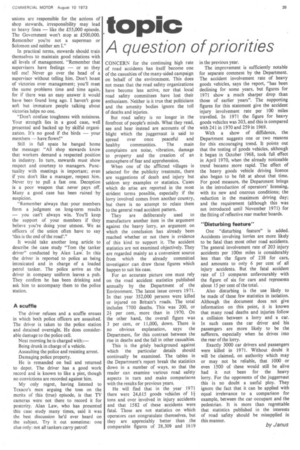ALAN LAW'S TEACH -IN
Page 38

Page 39

Page 40

Page 41

If you've noticed an error in this article please click here to report it so we can fix it.
John Darker continues his report of a Texaco industrial relations training course
WHEN I heard that Alan Law was leading a discussion on industrial relations at a course arranged by Texaco Ltd for supervisors and shop stewards, I was delighted to have the chance to sit-in on the occasion. Alan Law, in fact, has given a series of in-company talks to Texaco staff in parallel with Ken Jackson, the national secretary of the TGWU's commercial services group.
The basic content of the talks on the history, structure and objectives of the TGWU, and the responsibilities of shop stewards — to members, their union and their employers — was drawn up by Ken Jackson, but each officer uses his own background material for illustrative purposes.
Alan Law has become something of a legend as a result of the many industrial battles he has been embroiled in. To considerable numbers of Midlands hauliers Law is a scourge; to others, who have negotiated with him successfully and harmoniously, he is a tough negotiator whose word is his bond. His readiness to take on adversaries of all degrees of ferocity in the labour relations jungle has never been questioned to my knowledge.
Any suspicion that Mr Law, at an in-company seminar, would trim his sails and feed bromides to his shop steward colleagues, can be ruled out at once. Texaco, which negotiates nationally with the TGWU, may not have been pleased to hear him argue the case for local negotiations — and for the fullest freedom of both sides to negotiate regardless of pay and prices policies. It is to Texaco's credit that visiting speakers have full freedom to expound their personal views. In any case, I much doubt if Mr Law would submit to muzzling or self-censorship on any occasion.
A challenge His talk began with a challenge to the meeting to describe trade unionism.
One person said it was an association of people with similar interests, to which Mr Law replied that a fishing club would fit this description. "It's not a slot machine into which members put their money and get things out without any more effort on their part," he said. "Consider this definition: trade unionism is a continuing voluntary association of wage earners for the purpose of maintaining and improving wages and conditions of employment and providing certain benefits."
This meant, said Mr Law, that employees getting a rise today could not forget all about pay. "The employers don't forget about it. You don't have to bother about industrial relations — no one else will do it for you — but trade unions are voluntary. If they don't work it's your fault. You're the shareholders!"
A quip about Mr Heath being a TGWU member, in effect, because he was doing the union's negotiating this year with his Ll plus 4 per cent, launched Alan Law into an historical sketch of the factors promoting trade union organization in the past 300 years. The rise of skills led to groups of workers charging rates for the job. Loose groups of craftsmen fraternities tried to maintain rates. Employers and the governments of the day became alarmed and legislation was passed at intervals to frustrate union power.
Workers in jail So to the Industrial Relations Act which inspired Mr Law's contempt. "In Spain militant workers are imprisoned. It would happen here too if the Government could get away with it."
Of 650 unions Mr Law noted that only 180 were affiliated to the TUC. "There should be only one union; there's no prize for telling me which one!" And he went on to describe why the TGWU was always in the news because of its far flung membership — from Hebridean crofters to the staff of the War Graves Commission, more than 70 trade unions had scrapped their identity to become part of the TGWU, he told the Texaco men, going on to describe the union's 11 trade groups and the internal structure of the organization.
He stressed that the only vote he had in union matters was for the election of a general secretary or to accept or reject a salary offer. The union was not run by its officers. The job of the 600 officers was to train the membership, and this explained his endorsement of local negotiations and where possible — as with four Texaco depots — union branches based at the work-place. He contrasted composite branches containing members of several different trades with specialist branches. Altogether the TGWU had more than 7000 branches, some eilen for night workers only. The appointment of TGWU officers was taken very seriously by the General Executive Council. Rather than make a bad appointment — the best of the bunch on offer — the GEC would make no appointment. Experience of relevant industries was essential for certain appointments but Law admitted there were problems for offices administering dozens of different trades.
He discussed the arguments for specialist unions for different sectors, such as transport and docks, and claimed that the TGWU set-up provided scope for the autonomy of different trade groups while giving the necessary co-ordinating powers, and negotiating strength, to the union.
A shop steward asked Mr Law for his advice when a branch had two or three oil firms' workers in membership but one firm was much larger than the others. Law urged that each group of members, however small, should have a voice on the executive committee of the branch.
Appeals Another question related to appeals to the TGWU's appeals committee. What if the members were dissatisfied with ruling? "A member who is dissatisfied with a ruling can write to the general secretary giving reasons. The issue would be looked at again by the appeals committee. A major issue might ultimately result in a special conference of the union, though that would create an almighty stir."
Mr Law commented, in a review of the white-collar section of the TGWU (ACTS), that he didn't envy its officers. The clerical and supervisory membership was not gregarious. With some exceptions — like wages clerks at Standard — they were reluctant to stand together. He was "on his own" with his haulage workers.
Mr Law made no secret of his satisfaction that the vehicle builders' union (NUVB) had rejected overtures to join the AUEW — Hugh Scanlon's union — and had opted to join the TGWU. "The AUEW used to think we were a rabble; it's a bit different now. There is as much rivalry between unions as between employers," Mr Law declared passionately.
Drivers wages Lorry drivers' wages were generally good because of the car workers' efforts, said the TGWU organizer. "I used the example of car workers' wages when arguing the case for a Birmingham differential some time ago. Drivers are lucky they can exploit the value of their hgv licence and medical test — an advantage not available to most workers." And he told the Texaco men they were in the top pay bracket in Texaco if not the highest paid drivers in the country.
Law made some candid comments on the United Road Transport Union but expressed the hope that this union would decide to throw in its lot with the TGWU at its next conference.
He criticized the Lord Chancellor's suggestion that lorry drivers were not fined heavily enough. "We pay some fines from our distress fund; we should know," he said. Then he discussed the importance of the road transport membership, with their own trade group. Drivers, in fact, were represented on most trade groups and this gave them great power in industrial disputes. When the picket lines were drawn up, members from other trade groups in the TGWU did not ask whether the strike was official or unofficial.
Arising from a recent decision of the International Transport Workers' Federation (to which the TGWU pays an affiliation fee) to "put a block on transport between France and Britain for a week" in protest at the French decision to hold nuclear tests in the Pacific, Law declared with a grin: "We stopped a lorry with 12,000 lettuces from delivering in Birmingham. You should have seen the price of honeymoon salad in Birmingham that weekend!"
On dockers — with whom Mr Law has worked closely in the recent past — he said that it was natural for a work force of 40,000 which had once been 90,000, to resent the disruption to their way of life caused by modernization. The dockers felt their lives were going by on container lorries. Like coopers, dockers were a declining force, ever diminishing. "If all your traffic went by pipeline you wouldn't like it," he declared.
Alan Law is becoming active internationally now. He recently addressed an Italian trade union at Genoa, in Italian, (learned during the war) and he can get by in French. With Brian Mathers, his regional secretary, he recently negotiated an agreement with the Gelders Transport firm in Holland for a new distribution complex at Northampton. "1 asked them why Northampton, why not Birmingham," said Mr Law. "They said they expected Northampton would one day he accessible to barges.. ."
This reminded Mr Law that he negotiated pay for bargees and he told an amusing — and all-too-typical — story of his early career as a trade union officer. There had been no improvement in the extra pay given to canal workers for fishing "objects" from the canal since 1900. The employers did not want to concede anything, whereupon the canal chaps ceased to fish out the numerous dead cats, etc, for a few days. "When the lock gates became jammed by hundreds of animal corpses the employers very soon doubled the sixpence 'fishing bonus'," said Law, to general hilarity.
The possibility that the many thousands of drivers in the TGWU's Food, Drink and Tobacco trade group may join the commercial services trade group — of which Alan Law and Ken Jackson are officers — was discussed briefly. He told the Texaco men that the union's finance and general purposes committee was considering the question now. It would clearly consolidate the strength of drivers and the move would certainly be popular with drivers who feel they are a lone voice in a large trade group which cannot fully reflect their interests.
It was evident that the tachograph issue is still far from settled in the TGWU, despite reports from a number of sources that the union is coming to terms with the instruments soon to be enjoined by Mr Law said that the Christian Salvesen company, which had claimed its introduction of tachographs in vehicles was jointly agreed with their driving staff, had now removed the instruments at the instance of the TGWU.
Owner-drivers
In full stride, Mr Law proceeded to give a scintillating talk on his philosophy related to the shop steward's job. He condemned the growing practice of some firms — even in the oil industry — of offering employees vehicles on contract terms. "If Texaco offer you a vehicle on this basis, turn it down," he declared.
He was somewhat unfriendly to his union colleagues in the bus industry, with a strong hint that when the buses were off the roads in a strike, workers could get to work quicker in their cars! "Who'd work on buses?" he challenged. "It's bad enough to work shifts at an oil terminal," and winking wickedly at Ted Platt (Texaco's industrial relations supervisor) said: "I'm not stirring it up, Ted!"
He told of his hostility to the Engineering Employers' Federation which was not recognized by the TGWU. "All grades of workers in engineering are either skilled, semi-skilled or un-skilled. In their book drivers are semi-skilled. In my book they are skilled."
Of negotiations against professionals, solicitors and barristers, he said: "You can always beat solicitors or barristers because they rely on facts. We twist things round to give a trade union perspective."
He told of a recent fatal accident in France to a Wolverhampton driver "with six kids". Prompt action by the union with the British consul at Lyons commissioned a police report. A local solicitor was briefed and a French-speaking member of branch 5/35 in Birmingham went over to conduct inquiries. Any possibility of claiming against a third party for contributory negligence would be followed up, meanwhile the widow had been sent £500.
Texaco's stewards were told of the use made of Ruskin College economists in preparing pay claims against highly professional managerial teams, like the Ford Motor Company. They were reminded that the TGWU sponsored trade union candidates for Parliament; the prominent Birmingham 5/35 drivers' branch had indeed recently interviewed John Lee, a solicitor MP in the last Parliament, for two hours, before recommending him to the regional committee and national executive. "John Lee will contest the Handsworth division and I shall support him."
He stressed repeatedly the need for union negotiators to be highly professional in their approach to employers. "There may only be a margin of 4p in the pound to provide for an increase but it's still possible." He waved a minielectronic calculator: "This is getting worn out, stuck at £1 plus 4 per cent." He told of his tape-recorded notes, made in his car after meetings with employers.
"By the law of averages not all shop stewards are rabble rousers intent on bringing the country to ruin. There are 25,000 of them in my region alone with 45 officers serving 321,000 members. We could not get by without dedicated shop stewards."
Shop stewards, he went on, had to reconcile loyalties to their firm, to the union and to the members who elected them. The steward — but not in Texaco — could be asked to sanction excess hours or speeds. To the employer and to union members the shop steward was the union. Members might not know the name of the local union official; the steward's behaviour was taken as typical of the union. The steward was involved in a never-ending struggle to improve conditions — which could matter more than pay. And once a man had taken on a steward's job he had burned his boats — he might well have to choose between his wife and the union!
Said Mr Law: "I've been in management as well as being a shop steward so I see both points of view. Many have sacrificed domestic bliss for the union; others have said they couldn't continue because they dared not make this awful choice. It's not easy to be receptive to new ideas at your age; you're lucky to work for an enlightened firm who are paying you to learn about the TGWU and other relevant things,
"Some people would say why doesn't the union do the job of educating shop stewards. Take my district's 25,000 stewards; at, say, £8 a day, a one-day course would cost £200,000 — and a one-day course wouldn't help much. The good shop steward must largely educate himself. He should read Commercial Motor, for example, for the steward who thinks he knows it all is no good to his members or his firm."
Whatever the difficulties, and recognizing that stewards had a living to earn, Alan Law insisted that members must be kept up to scratch, "Card holders are no use to you or to the union."
Token strikes He continued: "The union expects stewards to have a thorough knowledge of agreements and to act as custodians of them. I am the chief negotiator in your industry and when agreement has been reached with senior management we're entitled to ask that you observe it strictly. There is no need for token strikes — though I've had my share of disputes. Now that unions are responsible for the actions of shop stewards, irresponsibility may lead to heavy fines — like the £35,000 episode. The Government won't stop at £500,000. Remember you're not a superman or Solomon and neither am L" In practical terms, stewards should train themselves to maintain good relations with all levels of management. "Remember that supervisors have feelings — or so they tell me! Never go over the head of a supervisor without telling him. Don't boast of victories over management; you'll meet the same problems time and time again, for if there was an easy answer it would have been found long ago. I haven't gone soft but immature people talking about victories helps no one.
"Don't confuse toughness with noisiness. Your strength lies in a good case, well presented and backed up by skilful organization. It's no good if the birds — your members — have flown!"
Still in full spate he banged home the message: "All shop stewards know that workers demand a respected position in industry. In turn, stewards must show respect and courtesy to managers. Punctuality with meetings is important; even if you don't like a manager, respect him. Never try to pull a fast one. Deception is a poor weapon that never pays off. Many a good case has been ruined • by suspicion.
"Remember always thatyour members form a judgment on long-term results — you can't always win. You'll keep the support of your members if they believe you're doing your utmost. We as officers of the union often have to say 'this is the end of the road'."
It would take another long article to describe the case study "Tom the tanker driver" conducted by Alan Law. In this the driver is reported to police as being intoxicated and in charge of a loaded petrol tanker. The police arrive as the driver in company uniform leaves a pub. They confirm he has been drinking and ask him to accompany them to the police station.
A scuffle
The driver refuses and a scuffle ensues in which both police officers are assaulted. The driver is taken to the police station and detained overnight. He does considerable damage to the police cell.
Next morning he is charged with:—
Being drunk in charge of a vehicle. Assaulting the police and resisting arrest. Damaging police property.
He is remanded on bail and returned to depot. The driver has a good work record and is known to like a pint, though no convictions are recorded against him.
My only regret, having listened to Texaco's men arguing the toss on the merits of this (true) episode, is that TV cameras were not there to record it for posterity. Alan Law, who has presented this case study many times, said it was the best discussion he'd ever heard on the subject. Try it out sometime: one clue only: not all tankers carry petrol!




























































































